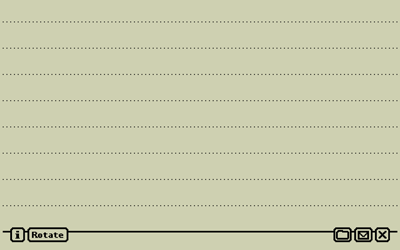November 1st, 2010

Peter Merholz reminds us the the dominant computer metaphor for the last 40 years has been the desktop, and it was Apple that brought that idea – files, documents, a trash can – to the masses.
Since 1984, we’ve seen other metaphors come along. The Newton operated on a kind of notepad metaphor – or an electronic personal organizer and day planner. Now, OS X 10.7 Lion, by way of iOS, gives us another way to interact with our files and windows: Launchpad.
From there to here, the desktop has been a good transition metaphor. Take what people know (working in an office, dealing with folders) and put it on a screen. Now we’re getting more abstract as the PC industry matures, and as we add more functionality to our machines.
[Via Daring Fireball.]
Posted by davelawrence8 at 6:57 am on November 1st, 2010. Categories: macs. Tags: desktop, file, folder, lion, mac, newton, OS X, PC. Subscribe via RSS.
December 21st, 2009

A little Christmas present for you: Grant Hutchinson has created a Newton-ized desktop wallpaper for your computer over at Simple Desktops.
Splorp has posted a few other simple desktops on the site, too – be sure to look for them.
Thanks Grant!
Posted by davelawrence8 at 7:28 am on December 21st, 2009. Categories: community, design. Tags: desktop, eMate, messagepad, newton, splorp, wallpaper. Subscribe via RSS.
April 29th, 2009
Steven Frank, at his stevenf.com blog, has been thinking about what could possible replace the desktop metaphor that XEROX and Apple helped to pioneer.
Besides the desktop paradigm, Frank describes the pros and cons of other computing models – like the Newton’s soup-based data model and the iPhone’s multi-touch platform.
The Newton’s model had benefits, Frank says, but crumbled under the weight of OS-to-OS translations:
The Newton’s object store was an engineering marvel that fell apart as soon as you needed to exchange data with the outside world. You couldn’t just take a text file and send it over to your Newton because the Newton didn’t understand the concept of “file”. Your text first had to go through a conversion (via Newton Connection Utility) into an object format that some Newton application (in this case, probably Notes) could handle. Then you’d have the reverse problem going the other way.
Because desktop apps and Newton apps would never offer exactly the same feature set, inevitably these conversions result in loss of some information. Nitty-gritty things like precise formatting, metadata, and so on are the first things out the window when you need to convert data between two formats. It leaves you with a “lowest common denominator” form of information exchange that’s more frustrating than just being able to send files around. But in order to “just send files around”, you’d have to jettison all your radical (and useful) innovations and go back to square one: the good old hierarchical file system.
It’s a heckuva read, even if Frank offers no clear solution to what will come (web apps? Spotlight?) after the desktop metaphor has outlived its usefulness.
John Gruber at Daring Fireball has mentioned this before, but what I like about the Newton OS is that everything is automatically saved for you. When you scribble out a new note, you never have to press a “save” button. The only action you take with a note, after you’ve finished it, is to move it into some sort of organizational file system. But that’s optional. If you don’t want to move it, you don’t have to; you can shut off your Newton and the note stays right where you left it.
It’s like the Notes app on the iPhone, or the Stickies app on the Mac. Everything is automatically saved to some arcane folder deep in the Mac Library system.
What do you think? What’s the best possible platform to inherit the desktop’s dominance in computing?
Posted by davelawrence8 at 6:13 am on April 29th, 2009. Categories: ipod/iphone, macs, newton, software. Tags: computer, desktop, file, iphone, messagepad, newton, operating system, OS. Subscribe via RSS.
February 4th, 2009
Shawn Blanc, in his review of the Mac and iPhone versions of Things:
I don’t think the new spins on productivity software are because we have yet to witness the creation of the Ultimate App and Workflow. These unique and diverse apps are being written because people are unique and diverse.
Each of us has our own way of dealing with responsibility and our own expression of productivity. Tinkering and then switching is usually not the fault of the software. We’re not looking the best app, but rather the best app for us.
I use the desktop version of Things, and have since the 0.8 beta version, and I love it. I haven’t purchased the iPhone version yet, however, but plan to in the near future. Of all the things that are most Newton-like about the iPhone, it’s Thing’s sync-ability between the iPhone and Mac apps that most excites me.
Since Apple can’t get off its dead ass and provide iCal to-do syncing, leave it to third parties to fill the gap.
And Shawn is right: I’ve tried a few to-do apps, and none have really caught on. Things caught on, and I think it’s because it gloms onto whatever your style is. Hardcore GTDer? Scatterbrained lightweight? Things is for both of you.
[Via Daring Fireball]
Posted by davelawrence8 at 7:29 am on February 4th, 2009. Categories: GTD, software. Tags: desktop, GTD, iphone, mac, sync, things, to do. Subscribe via RSS.

